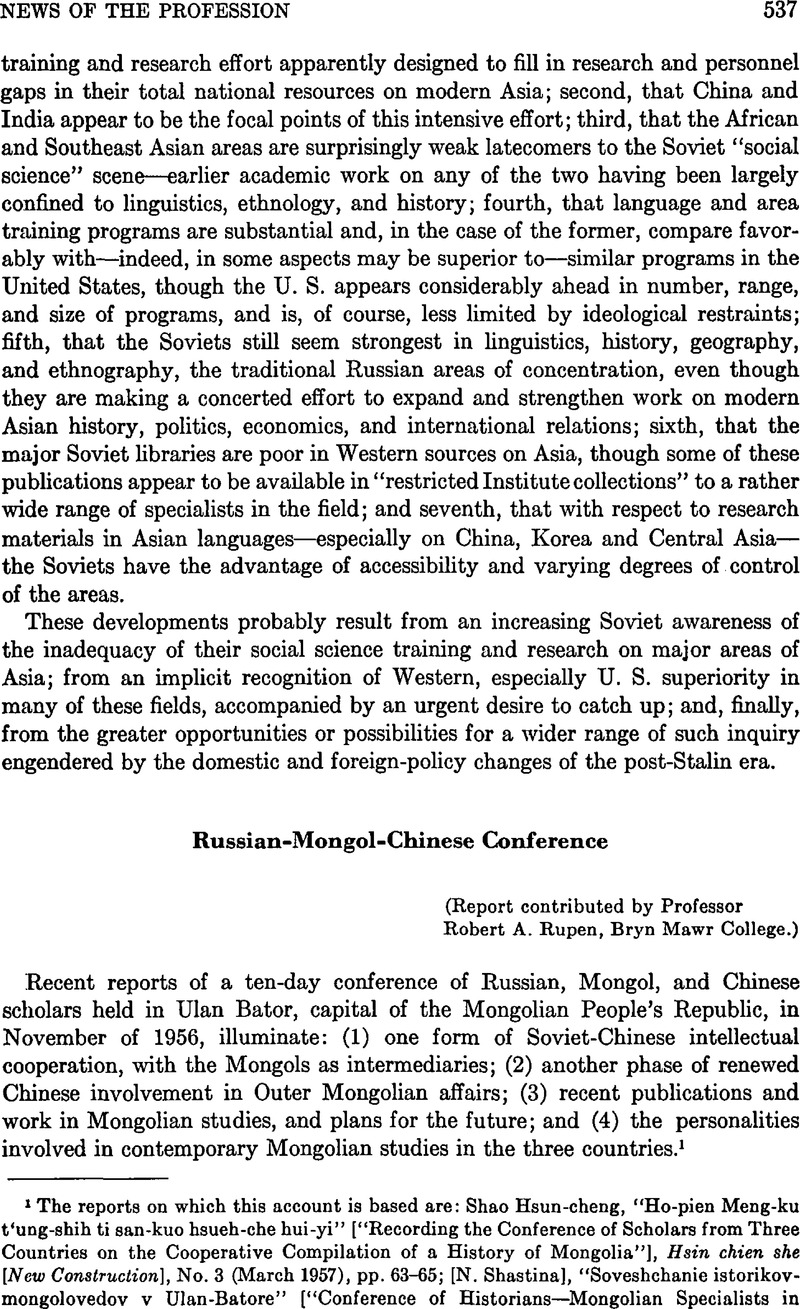No CrossRef data available.
Article contents
Russian-Mongol-Chinese Conference
Published online by Cambridge University Press: 23 March 2011
Abstract

- Type
- News of the Profession
- Information
- Copyright
- Copyright © The Association for Asian Studies, Inc. 1958
References
1 The reports on which this account is based are: Shao Hsun-cheng, “Ho-pien Meng-ku t'ung-shih ti san-kuo hsueh-che hui-yi” [“Recording the Conference of Scholars from Three Countries on the Cooperative Compilation of a History of Mongolia”], Hsin chien she [New Construction], No. 3 (March 1957), pp. 63–65; [N. Shastina], “Soveshchanie istorikov-mongolovedov v Ulan-Batore” [“Conference of Historians—Mongolian Specialists in Ulan Bator”], Sovetskoe Vostokovedenie [Soviet Oriental Studies], No. 2 (1957), pp. 171–175; and I. Ya. Zlatkin and S. V. Kiselev, “Soveshchanie istorikov Mongol'skoi Narodnoi Respubliki, Kitaiskoi Narodnoi Respubliki, i Sovetskogo Soyuza v Ulan-Batore” [“Conference of Historians of the Mongolian People's Republic, Chinese People's Republic, and the Soviet Union in Ulan Bator”], Voprosy Istorii [Questions of History], No . 2 (1957), pp. 211–213. Only the citation of a Mongolian report of the same conference was available: Kh. Ser-Ozhav, “Gurvan ulsyn tuiikhchdiin zovlolgoon” [“A Conference of Historians of Three Nations”], Shinzhlekh ukhaan [Science], No. 1 (1957), pp. 40–41.
Cf. N. N. Poppe, “Mongolovedenie v SSSR” [“Mongolian Studies in the USSR”], Vestnik instituta po izucheniyu istorii i kul'luri SSSR [Journal of the Institute for Study of the History and Culture of the USSR], No . 1 (14) (Munich, 1955), pp. 25–43; and Rupen rev. of Istoriya MNR [History of the MPR] (Moscow, 1954), in Central Asiatic Journal, I, No. 4 (1955), 297–308.
2 See Rupen, “Notes on Outer Mongolia Since 1945,” and “Outer Mongolia Since 1955,” PA, XXVIII (March 1955), 71–79, and XXX (Dec. 1957), 342–357.
3 Puntsuknorob wrote Mongolyn avtonomii ūyeiin tūūkh, 1911–1919 [A History of the Period of Mongolian Autonomy, 1911–1919] (Ulan Bator, 1955).
4 See Perlee's important article, “K istorii drevnikh gorodov i poselenii v Mongolii” [“Towards the History of Ancient Cities and Settlements in Mongolia”], Sovetskaya Arkheologiya [Soviet Archaeology], No. 3 (1957), pp. 43–53.
5 Damdinsuren, now a professor at Choibalsan University in Ulan Bator, was born in 1908; from 1933 to 1938, and again in 1949, he studied in Leningrad at the Institute of Oriental Studies. From 1942 to 1946 he edited the leading Ulan Bator newspaper, Vfnen [“Pravda”], and he holds three Choibalsan Prizes. His most recent work is Isloricheskie korni Geseriada [Historical Basis of the Geser Saga] (Moscow-Leningrad, 1957).
6 See Tumur-Ochir's recent article, “ 0 nekapitalisticheskom puti razvitiya otstalykh stran kommunizmu” [“About the Non-Capitalist Route of Development of Backward Countries to Communism”], Voprosy Filosofii [Questions of Philosophy], No. 1 (1956).
7 Natsokdorji, Aratskoe osvoboditel'noe dvizhenie v Khobdoskom raione Vneshnei Mongolii pod rukovodstvom Ayushi [The Arat Freedom-Movement in the Kobdo District of Outer Mongolia under the Leadership of Ayushi].
8 Lubsandendeb has compiled an important, 22,000-word Mongolian-Russian dictionary: Mongol-Oros lol'; Mongol'sko-Russkii slovar' (Moscow, 1957).
9 Cf. Altan Tobči, A Brief History of the Mongols by bLobzan bsTan-'jin, Scripta Mongolica I (Cambridge, Mass., 1952), and Erdeni-yin Tobči, Mongolian Chronicle by Savang Sehen, 4 vols., Scripta Mongolica II (1956).
10 Kiselëv's several published works include, Drevnyaya istoriya Yuzhnoi Sibiri [Ancient History of Southern Siberia] (Moscow, 1951), and an important chapter on the culture of the Mongols in the 12th-14th centuries in the 1954 Istoriya MNR (see n. 1).
11 The publications of Zlatkin, a leading Soviet writer on contemporary Outer Mongolia, include: Mongol'skaya Narodnaya Respublika (Moscow, 1950), and the sections on Mongolia in Novaya istoriya stran zarubezhnogo Vostoka [New History of Countries of the Foreign Orient], I, 239–261, 513–523; II, 90–104. He also edited the significant 1952 compilation, MNR-Sbornik statei [MPR-Collection of Articles], and in the 1930's he edited the Ulan Bator journal, Sovremennaya Mongoliya [Contemporary Mongolia]. (The bulk of this journal i s now available on microfilm at the Library of Congress.)
12 Staritsina's publications include articles in the Trudy Moskovskogo institula vostoko-vedeniya [Proceedings of the Moscow Institute of Oriental Studies], No. 2 (1940), pp. 153–168, and No. 5 (1947), pp. 285–296; and in the Kratkie soobshchenie instituta vostokovedeniya [Brief Communications of the Institute of Oriental Studies], V (1952), 3–16; VI (1952), 3–15. Shastina's work includes two translations published in 1957: Shara tudzhi; Mongol'skaya letopis' XVII veka [Sara tuji; Mongolian Chronicle of the 17th Century], and Dzhiovanni del' Piano Karpini, “Istoriya Mongalov”; Gil'om de Rubruk, “Puteshestvie v vostochnye slrany” [Giovanni del Plano-Carpini, “History of the Mongols”; William of Rubruk, “Travels in Eastern Countries”].
13 One of Yakimov's articles is “K voprosu ob obshchestvennom stroe dorevolyutsionnoi Mongolii i o roli lamaizma” [“On the Question of the Social Structure of Pre-Revolutionary Mongolia and the Role of Lamaism”], Trudy Moskovskogo instituta vostokovedenie, No. 2 (1940).
14 Dylykov is a Buryat Mongol scholar at the Institute of Oriental Studies, Moscow. He wrote Demokraticheskoe dvizhenie mongol'skogo naroda v Kitae [Democratic Movement of the Mongolian People in China] (Moscow, 1953). See Rupen rev., FEQ, XIV (Aug. 1955), 599–602.
15 The Chinese are translating: B. Ya. Vladimirtsov, Obshchestvennii stroi mongolov (Leningrad, 1934) [Carsow's French translation is, Le Régime social des Mongols (Paris, 1948)]; the Stalin Prize-winning, Zolotaya Orda i eē Padenie (2nd ed., Moscow-Leningrad 1950) [Thuret's French translation is, La horde d'or; la domination tatare au XIII et au XIV siècle de la Merjaune á la Mer noire (Paris, 1939)]; and C. d'Ohsson's four-volume, Histoire des Mongols depuis Tchinguiz-Khan jusqu'à Timour Bey ou Tamerlane (The Hague and Amsterdam, 1834).


